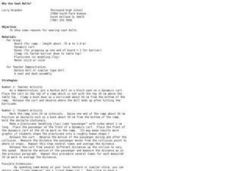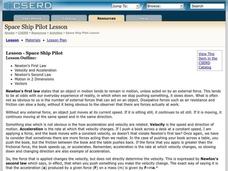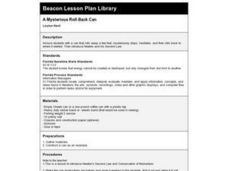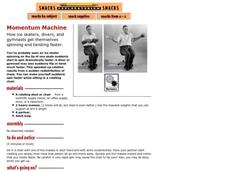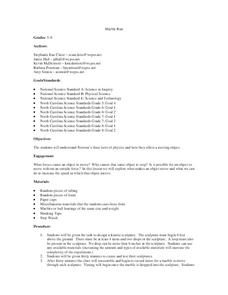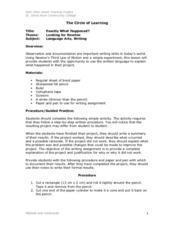Curated OER
Newton's Second Law
For this Newton's Second Law worksheet, learners answer 13 questions about force, mass and acceleration. They calculate weight, force, masses and acceleration of objects.
Curated OER
Motion Through the Ages
Eighth graders conduct internet research to produce a timeline of man's growth in understanding of concepts of motion and planetary motion through history.
Curated OER
Why Use Seat Belts?
Students explore reasons why using a seat belt is a safe choice while riding in a car. In this physics/safety instructional activity, students set up and observe a doll with and without a seat belt moving down a ramp in a dynamics cart....
Curated OER
Space Ship Pilot
Students visualize the relation between acceleration and velocity in 2 dimensions. They are introduced to Newton's first law,and Newton's second law. Students work on an exploration activity where they condsider an example of a...
Curated OER
A Mysterious Roll-Back Can
Middle schoolers explore Newton and his Second Law by observing a demonstration involving a can that rolls away, then rolls back to where it started. They construct their own Come Back Can and describe how the cans work.
Teach Engineering
Android Acceleration
Prepare to accelerate your Android. Pupils prep for the upcoming activity in this third installment of a four-part series. The lesson progresses nicely by first introducing different types of acceleration to the class. The teacher...
DiscoverE
Rocket-Powered Ski Lift
If a ski lift had rockets, imagine how fast it would be! Scholars let their imaginations take flight as they build models for such a ski lift. Rather than using a rocket, though, they'll use a much safer balloon as the power source.
Teach Engineering
Exploring Acceleration with an Android
Small groups use rubber bands to accelerate an Android device along a track of books. They collect the acceleration data and analyze it in order to determine the device's velocity.
Exploratorium
Momentum Machine
If you have a rotating office chair in your classroom, you can have physics pupils participate in this simple, yet effective demonstration of angular momentum. One partner sits in the chair, arms outstretched, holding heavy weights. The...
Curated OER
Marble Run
Students use marbles to conduct experiments on movement of objects and explore Newton's three laws of motion. In this motion lesson plan, students use marbles, tubing, foam, paper cups, and more.
Curated OER
Lab for Truss Design and Testing
Learners design and build their own truss. For this physics lesson, students calculate the forces and maximum load. They complete a full scale diagram of their design.
College Board
AP Physics 1 and 2 Inquiry-Based Lab Investigations
Have you ever wondered what type of AP Physics investigations The College Board wants? This is the guide for you! Sixteen labs covering both Physics I and II will get you started and inspire you to meet the requirement of 25 percent of...
Curated OER
Balloon Rockets
Students, after reviewing and analyzing Newton's third law of motion, make balloon rockets and experiment with a variety of models. After the experiment, they chart the results and form conclusions. In addition, they compare/contrast...
Curated OER
The Circle of Learning
Students review Newton's Third Law of Motion and participate in an experiment. After the experiment, they use their notes to write a scientific summary of what happened during the project. They present their project to the class and...
Curated OER
Rocket Science 101
Students explore the aspects of Newton's First and Third Laws of Motion as they conduct controlled rocketry experiments and analyze the Mars Mission in terms of the principles of rocketry.
Curated OER
The Physics of Hummingbirds: Magic in the Air
Students study hummingbirds and how they use Newton's law. In this motion lesson students complete several activities and view videos of hummingbirds.
Curated OER
People of the Scientific Revolution
In this Scientific Revolution worksheet, learners read a brief overview of the contributions of Copernicus, Bacon, Kepler, Galileo, Newton, and Harvey.
National Research Center for Career and Technical Education
Lou-Vee-Air Car
Who said teaching a STEM lesson had to be challenging? Incorporate a career and technology-centered car build into your upcoming force lesson plan, and your class will be moving down the road in no time! Pupils practice...
CK-12 Foundation
Hot Air Balloon
How can people control a hot air balloon? The simple simulation allows scholars to adjust the payload mass, burner, and vent position on a hot air balloon and observe the changes in velocity and altitude over time. Challenge questions...
CK-12 Foundation
Everglades Airboat
How does an airboat move when there isn't a motor in the water? The simulation teaches the forces related to the thrust and drag on an airboat. Scholars vary the boat mass and thrust force in order to view graphs of the changing force...
It's About Time
Run and Jump
Has your class wondered how fast a human could run or how high they are capable of jumping? Help them understand these concepts as they explore acceleration and use an accelerometer to make semiquantitative measurements of acceleration...
Bowels Physics
Impulse and Momentum
Be impulsive with your high school physics class. Emerging physicists review the slide presentation and learn about impulse, momentum, collisions, and how each variable may be affected. They complete practice problems and conclude with a...
It's About Time
Automatic Triggering Devices
How does the air bag trigger in an accident? The lesson explores how automatic triggering devices work in automobiles. Using examples such as a seat belt lock and air bag, scholars design their own device to better understand the...
CK-12 Foundation
Pirate Ship
Everything that happens is an interaction, from the wind blowing a sail to a cannon ball being thrust out of a cannon. A simulation shows the interactions involving a sail, air, ball, pirate, cannon, deck, ocean, and the Earth and the...




